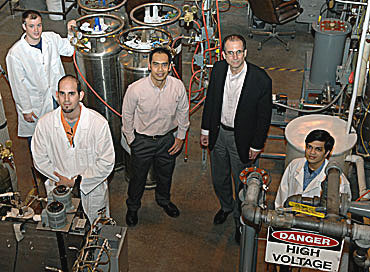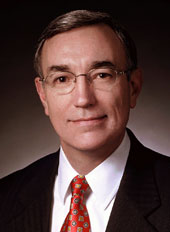Iowa State establishes Bioeconomy Institute to advance biorenewable research
10-31-07

Iowa State University's new Bioeconomy Institute will support and advance work in biorenewable technologies. One example is researching how fast pyrolysis can convert biomass into a bio-oil. Here, pictured left to right in the middle of Iowa State's fast pyrolysis equipment at the Iowa Energy Center's BECON facility, are Derek Wissmiller, a doctoral student in mechanical engineering; Pedro Ortiz, a doctoral student in chemical and biological engineering; Justinus Satrio, the program manager for Iowa State's Center for Sustainable Environmental Technologies; Robert C. Brown, Iowa Farm Bureau Director of Biorenewables Programs at Iowa State and the new institute's director; and Pushkaraj Patwardhan, a doctoral student in chemical and biological engineering. Photo by Bob Elbert.
Contacts:
Gregory Geoffroy, President, (515) 294-2042, geoffroy@iastate.edu
Robert C. Brown, Bioeconomy Institute, (515) 294-7934, rcbrown@iastate.edu
Mike Krapfl, News Service, (515) 294-4917, mkrapfl@iastate.edu
Iowa State establishes Bioeconomy Institute to advance biorenewable research
AMES, Iowa -- Iowa State University is establishing a Bioeconomy Institute to help the university and state maintain their leadership in biorenewable fuels, chemicals and technologies.
The Board of Regents, State of Iowa, approved the new institute at its meeting today in Iowa City. The institute will be directed by Robert C. Brown, the Iowa Farm Bureau Director of Biorenewables Programs at Iowa State. The institute will replace Iowa State's Office of Biorenewables Programs. It will eventually be housed in a new Biorenewables Laboratory Building planned for the west side of campus.
"The new Bioeconomy Institute is extremely important to Iowa State, to Iowa and to our nation," said Iowa State President Gregory Geoffroy. "By developing technologies that depend on agricultural resources instead of imported petroleum, the institute can help improve our national security, transform rural economies and counter global climate change. This institute will also help the state remain a leader in meeting the country's needs for renewable fuels and products."
The institute is expected to build on the success of Iowa State's Office of Biorenewables Programs. Since the office was launched in 2002, it has attracted more than 150 faculty affiliates. Those affiliates won more than $43 million in sponsored funding through June 30, 2006. They generated more than $17 million in fiscal year 2006 alone.
Brown said the new institute's general goals include reducing the country's dependence on imported petroleum, developing sustainable biomass production practices that protect land and water resources, improving environmental quality by reducing the use of fossil fuels, diversifying markets for farmers' crops and creating jobs and opportunities for rural communities where biomass crops are grown and processed.
Brown also said the institute's initial work will focus on six program areas: corn to biofuels; biorenewable chemicals; thermochemical technologies such as gasification and fast pyrolysis; harvest, storage and transportation of biomass; feedstock production; and biorenewables education.
A key to advancing that research is growing administrative and staff support for the research programs.
"Establishing the Bioeconomy Institute gives us an opportunity to set up an administrative team that has the time and resources to help us accomplish even more," Brown said.
The institute, for example, will support faculty who lead major grant applications. It will also add a staff person to help prepare proposals and administer large contracts. And it will add a staff person to work as a liaison with federal agencies and companies.
Brown said faculty in the past struggled to find time to help administer the program, pursue large grant proposals, travel to funding agencies and coordinate visits from companies interested in supporting research.
All of the support made possible by the new institute will help Iowa State advance the science and engineering behind the emerging bioeconomy.
"The institute will build upon a five-year initiative at ISU that has brought us to national prominence in the field of biofuels and bioenergy," says the proposal for the institute. "The establishment of the institute will help assure ISU's continued prominence in this rapidly advancing field."
-30-
